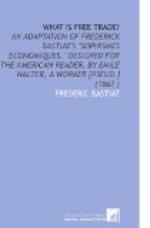I could speak at great length upon this subject, but prefer illustrating my thought by an example.
A countryman had twenty acres of land, with a capital of $10,000. He divided his land into four parts, and adopted for it the following changes of crops: 1st, maize; 2d, wheat; 3d, clover; and 4th, rye. As he needed for himself and family but a small portion of the grain, meat, and dairy produce of the farm, he sold the surplus and bought iron, coal, cloths, etc. The whole of his capital was yearly distributed in wages and payments of accounts to the workingmen of the neighborhood. This capital was, from his sales, again returned to him, and even increased from year to year. Our countryman, being fully convinced that idle capital produces nothing, caused to circulate among the working classes this annual increase, which he devoted to the inclosing and clearing of lands, or to improvements in his farming utensils and his buildings. He deposited some sums in reserve in the hands of a neighboring banker, who on his part did not leave these idle in his strong-box, but lent them to various tradesmen, so that the whole came to be usefully employed in the payment of wages.
The countryman died, and his son, become master of the inheritance, said to himself: “It must be confessed that my father has, all his life, allowed himself to be duped. He bought iron, and thus paid tribute to England, while our own land could, by an effort, be made to produce iron as well as England. He bought coal, cloths, and oranges, thus paying tribute to New Brunswick, France, and Sicily, very unnecessarily; for coal may be found, doeskins may be made, and oranges may be forced to grow, within our own territory. He paid tribute to the foreign miner and the weaver; our own servants could very well mine our iron and get up native doeskins almost as good as the French article. He did all he could to ruin himself, and gave to strangers what ought to have been kept for the benefit of his own household.”
Full of this reasoning, our headstrong fellow determined to change the routine of his crops. He divided his farm into twenty parts. On one he dug for coal; on another he erected a cloth factory; on a third he put a hot-house and cultivated the orange; he devoted the fourth to vines, the fifth to wheat, &c., &c. Thus he succeeded in rendering himself independent, and furnished all his family supplies from his own farm. He no longer received anything from the general circulation; neither, it is true, did he cast anything into it. Was he the richer for this course? No; for his mine did not yield coal as cheaply as he could buy it in the market, nor was the climate favorable to the orange. In short, the family supply of these articles was very inferior to what it had been during the time when the father had obtained them and others by exchange of produce.




